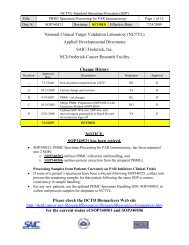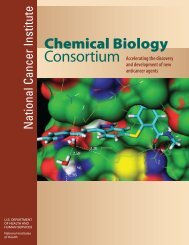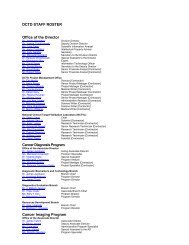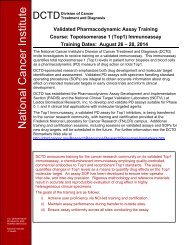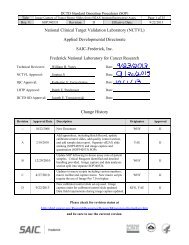National Cancer Institute - NCI Division of Cancer Treatment and ...
National Cancer Institute - NCI Division of Cancer Treatment and ...
National Cancer Institute - NCI Division of Cancer Treatment and ...
You also want an ePaper? Increase the reach of your titles
YUMPU automatically turns print PDFs into web optimized ePapers that Google loves.
<strong>National</strong> <strong>Cancer</strong> <strong>Institute</strong>.<br />
discovery <strong>of</strong> new, rationally based <strong>and</strong><br />
natural source–derived anticancer treatments<br />
<strong>and</strong> strategies. Through funding<br />
provided under a request for applications<br />
(RFA) (http://grants.nih.gov/grants/guide/<br />
rfa-files/RFA-CA-05-001.html), which<br />
expired in May 2004, the NCDDG supports<br />
13 multidisciplinary groups in the discovery<br />
<strong>of</strong> new anticancer drugs.<br />
This program is one <strong>of</strong> the first examples<br />
<strong>of</strong> <strong>NCI</strong> partnering with private industry.<br />
The NCDDG program has assisted in the<br />
development <strong>of</strong> four FDA-approved anticancer<br />
agents: topotecan, NSC 609699<br />
(Hycamtin®); Gliadel® Wafers, NSC 714372;<br />
denileukin diftitox, NSC 733971 (Ontak®);<br />
<strong>and</strong> cetuximab, NSC 714692 (Erbitux®).<br />
The Biological Resources Branch has<br />
been instrumental in the production<br />
<strong>of</strong> vaccines <strong>and</strong> other biologic agents,<br />
especially for NCDDGs that lacked a<br />
major industrial partner.<br />
102 ■ P R O G R A M A C C O M P L I S H M E N T S 2 0 0 6<br />
■ ■ ■<br />
Translating promising target-directed compounds<br />
into drugs for human use is an exacting task that<br />
requires very specific, interrelated activities.<br />
Gliadel® Wafers being implanted in the brain at the site <strong>of</strong> a resected tumor.<br />
DTP’s NCDDG helped develop this new form <strong>of</strong> carmustine, a successful<br />
anticancer agent.<br />
Although NCDDG projects do not support<br />
clinical trials, timely clinical evaluation<br />
<strong>of</strong> agents discovered through NCDDG is<br />
encouraged.<br />
No new applications for this program are<br />
being accepted at this time.<br />
Drug Development<br />
Rapid Access to Intervention<br />
Development—for Academics<br />
http://dtp.nci.nih.gov/docs/raid/<br />
raid_index.html<br />
Contact:<br />
Coordinator, RAID Program<br />
301-496-8720, raid@dtpax2.ncifcrf.gov<br />
Translating promising target-directed<br />
compounds into drugs for human use is<br />
an exacting task that requires very specific,<br />
interrelated activities. <strong>NCI</strong> supports this<br />
critical arm <strong>of</strong> drug development through<br />
a variety <strong>of</strong> initiatives, including DTP’s<br />
Rapid Access to Intervention Development<br />
(RAID) program.<br />
RAID provides preclinical drug <strong>and</strong> biologic<br />
development resources to academic investigators<br />
who want to conduct their own<br />
clinical trials. Once an optimal compound<br />
is selected via R·A·N·D or another discovery<br />
path, RAID facilitates further preclinical<br />
development.<br />
Since its inception in 1998, the RAID program<br />
has approved 104 projects, through<br />
which 13 small molecules <strong>and</strong> 11 biologic<br />
agents later entered clinical trials.<br />
The goal <strong>of</strong> RAID is to provide clinical<br />
pro<strong>of</strong> <strong>of</strong> principle that a new molecule<br />
or approach is a viable c<strong>and</strong>idate for



